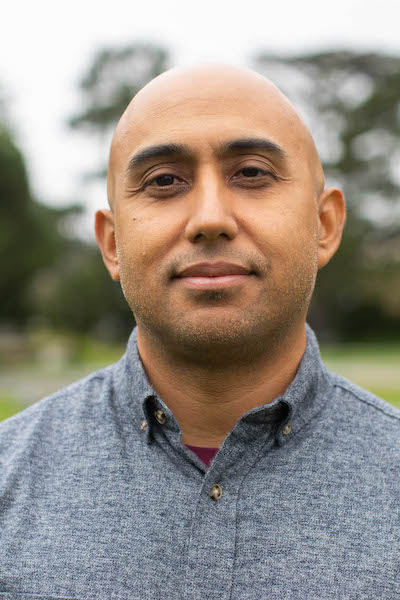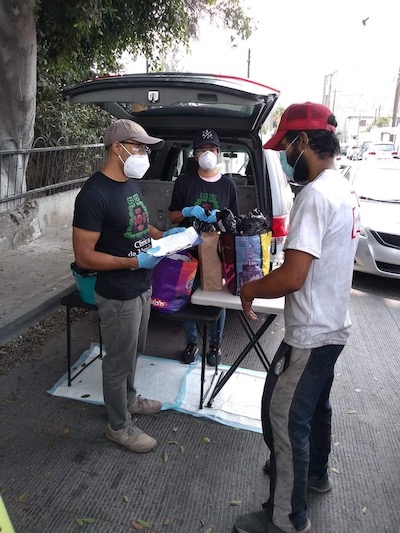Carlos Martinez, Assistant Professor of Migrant Health and Social Justice
From what program and institution are you coming to UCSC?
I graduated from the Joint Program in Medical Anthropology at UC San Francisco and UC Berkeley. At UCSF I was affiliated with the Department of Humanities & Social Sciences and at UC Berkeley I was affiliated with the Department of Anthropology.
What degree did you earn at your previous institution?
I earned a PhD in Medical Anthropology.
In 2-3 sentences, please tell us about your main research project.
My current research project, which is based primarily in Tijuana, Mexico, examines how anti-immigrant U.S. policies have essentially turned Mexican cities along the border with the United States into prisons for Mexican deportees and asylum seekers from Central America and the Caribbean. I am interested in how this has impacted on the health and life outcomes of members of these communities. Through my research, I have also worked closely with grassroots medical organizations that are providing various forms of care and solidarity to these communities.
How did you become interested in your main research project?I started my project with an interest in researching the health impacts of deportation and what happens after people are deported. As I was starting my fieldwork, the U.S. government began to implement several policies that dramatically altered the experiences and trajectories of asylum seekers by keeping them stuck at the U.S.-Mexico border. I then became interested in exploring how the dynamics affecting the lives and health of deportees and asylum seekers were tied together.
What or who inspired you to become a scholar and teacher? Was there a particular experience or person?Shortly before I decided to go back to school to get a Master of Public Health degree, I got involved with a four-year study funded by the National Institutes of Health focused on the social factors that negatively affect the health of Latino day laborers in San Francisco and the East Bay. The project, which was being co-led by Dr. James Quesada at San Francisco State University and Dr. Kurt Organista at UC Berkeley, used a mixed-methods approach combining ethnographic research methods with quantitative research methods. I was fortunate to be trained in ethnographic research methods by Dr. Quesada, who is a medical anthropologist. Prior to working with this project, I had no idea what medical anthropology was or what medical anthropologists did. But, through working as a research assistant with Dr. Quesada I was able to get a real inside view of how ethnography can be practiced and the benefits of using this method to understand the experiences and life worlds of the communities you are studying. I found ethnographic research to be a very fulfilling practice and that it came somewhat naturally to me. There was no going back after that. I realized that this is something I could commit to doing for the rest of my life.
What impact would you like your research to have on the communities with whom you work, your students, academia, and/or society?We never know what kind of impact our research will have. While I hope that my research is impactful enough to change some of the conditions impacting the communities I study, this is never guaranteed. But this is why I think I find it so important to support the organizations that are already on the ground doing the work to support marginalized communities as part of my research process. Though producing more knowledge about social inequalities is important, this alone is insufficient for creating political change. At the end of the day, grassroots organizing and movement building is what gets the goods. All that being said, I hope that my research brings some of the conditions impacting deportees and asylum seekers into sharper focus so that a wider community of people, including students, can get involved in pushing back against anti-immigrant policies.
What do you like most about being a scholar and teacher?As a scholar, I love learning new things and new ways to think about our world. The fact that I get to facilitate learning experiences for students that open them to up to new ways of seeing the world and understanding their place within it is exciting for me. I’ve always been the kind of person who has enjoyed sharing books, articles, films, or music that I’ve discovered with friends, so the fact that I basically get to do this in my role as an educator makes me feel very fortunate. I get particularly excited about conversations that shift my own thinking and open up new perspectives for me and others, so I’m looking forward to having this experience in the classroom with students.
What do you like to do when you’re not working?In my spare time, I like taking hikes in nature, cooking new recipes, watching good films (or just a good show), going to see live music, going to community events, checking out an art exhibit, and just hanging with friends and family. These days I’m also always trying to find new ways to stay physically active. Right now, for example, I’m trying to get more into bicycling and surfing.
What are you looking forward to doing at UCSC and/or in Santa Cruz?At UCSC, I’m looking forward to developing relationships with faculty and students from across the university. I hope to collaborate with other faculty in efforts aimed at advancing health equity and in creating opportunities for students who want to pursue health and medicine-related careers. I’m especially excited about supporting the development of the university’s new Global and Community Health (GCH) program as a core faculty member. I’m looking forward to bringing a perspective grounded in Latin American and Latino studies as well as the medical social sciences towards shaping the GCH’s future research and programmatic endeavors. I’m also interested in developing partnerships with organizations engaged in health advocacy among Latinx communities in the Santa Cruz area and adjacent counties. On a more personal note, I’m really excited about getting to know the area better and enjoying all of the beautiful nature that it has to offer.
What would you like members of the LALS community to know about you and/or your work?I would like members of the LALS community to know that I’m excited to meet them! I’m a very approachable person, so please feel free to reach out if you are interested in meeting to talk or take a walk on campus.


